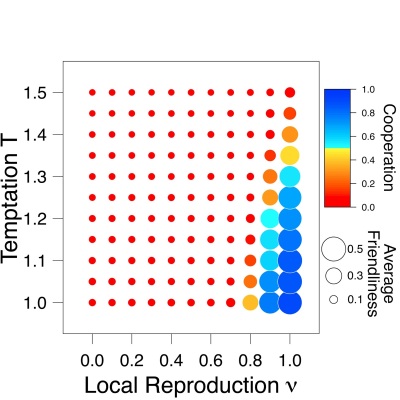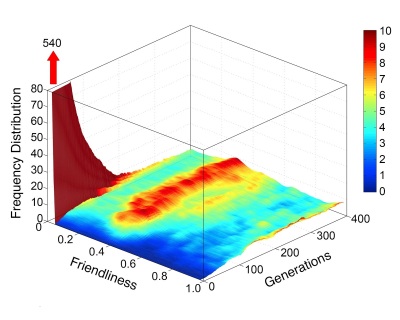“Networked minds” require a fundamentally new kind of economics
Below is a guest post from Christian Waloszek, a “young scholar” I met at INET’s Hong Kong conference earlier this month. It summarizes an interesting and unusual paper which he co-authored and that relates to things discussed on this blog. http://www.nature.com/srep/2013/130319/srep01480/full/srep01480.html
“Networked Minds” Require A Fundamentally New Kind of Economics
In their computer simulations of human evolution, scientists at ETH Zurich find the emergence of the “homo socialis” with “other-regarding” preferences. The results explain some intriguing findings in experimental economics and call for a new economic theory of “networked minds”.
Economics has a beautiful body of theory. But does it describe real markets? Doubts have come up not only in the wake of the financial crisis, since financial crashes should not occur according to the then established theories. Since ages, economic theory is based on concepts such as efficient markets and the “homo economicus”, i.e. the assumption of competitively optimizing individuals and firms. It was believed that any behavior deviating from this would create disadvantages and, hence, be eliminated by natural selection. But experimental evidence from behavioral economics show that, on average, people behave more fairness-oriented and other-regarding than expected. A new theory by scientists from ETH Zurich now explains why.
“We have simulated interactions of individuals facing social dilemma situations, where it would be favorable for everyone to cooperate, but non-cooperative behavior is tempting,” explains Dr. Thomas Grund, one of the authors of the study. “Hence, cooperation tends to erode, which is bad for everyone.” This may create tragedies of the commons such as over-fishing, environmental pollution, or tax evasion.
Evolution of “friendliness”
Prof. Helbing of ETH Zurich, who coordinated the study, adds: “Compared to conventional models for the evolution of social cooperation, we have distinguished between the actual behavior – cooperation or not – and an inherited character trait, describing the degree of other-regarding preferences, which we call the friendliness.” The actual behavior considers not only the own advantage (“payoff”), but also gives a weight to the payoff of the interaction partners depending on the individual friendliness. For the “homo economicus”, the weight is zero. The friendliness spreads from one generation to the next according to natural selection. This is merely based on the own payoff, but mutations happen.
For most parameter combinations, the model predicts the evolution of a payoff-maximizing “homo economicus” with selfish preferences, as assumed by a great share of the economic literature. Very surprisingly, however, biological selection may create a “homo socialis” with other-regarding preferences, namely if offsprings tend to stay close to their parents. In such a case, clusters of friendly people, who are “conditionally cooperative”, may evolve over time. If an unconditionally cooperative individual is born by chance, it may be exploited by everyone and not leave any offspring. However, if born in a favorable, conditionally cooperative environment, it may trigger cascade-like transitions to cooperative behavior, such that other-regarding behavior pays off. Consequently, a “homo socialis” spreads.
Networked minds create a cooperative human species
“This has fundamental implications for the way, economic theories should look like,” underlines Professor Helbing. Most of today’s economic knowledge is for the “homo economicus”, but people wonder whether that theory really applies. A comparable body of work for the “homo socialis” still needs to be written.
“While the “homo economicus” optimizes its utility independently, the “homo socialis” puts himself or herself into the shoes of others to consider their interests as well,” explains Grund, and Helbing adds: “This establishes something like “networked minds”. Everyone’s decisions depend on the preferences of others.” This becomes even more important in our networked world.
A participatory kind of economy
How will this change our economy? Today, many customers doubt that they get the best service by people who are driven by their own profits and bonuses. “Our theory predicts that the level of other-regarding preferences is distributed broadly, from selfish to altruistic. Academic education in economics has largely promoted the selfish type. Perhaps, our economic thinking needs to fundamentally change, and our economy should be run by different kinds of people,” suggests Grund. “The true capitalist has other-regarding preferences,” adds Helbing, “as the “homo socialis” earns much more payoff.” This is, because the “homo socialis” manages to overcome the downwards spiral that tends to drive the “homo economicus” towards tragedies of the commons. The breakdown of trust and cooperation in the financial markets back in 2008 might be seen as good example.
“Social media will promote a new kind of participatory economy, in which competition goes hand in hand with cooperation,” believes Helbing. Indeed, the digital economy’s paradigm of the “prosumer” states that the Internet, social platforms, 3D printers and other developments will enable the co-producing consumer. “It will be hard to tell who is consumer and who is producer”, says Christian Waloszek. “You might be both at the same time, and this creates a much more cooperative perspective.”
Further information:
Thomas Grund, Christian Waloszek, and Dirk Helbing (2013) How natural selection can create both, self- and other-regarding preferences, and networked minds. Scientific Reports 3, 1480; see http://www.nature.com/srep/2013/130319/srep01480/full/srep01480.html
Figure caption: Local reproduction is crucial for the transition from a “homo economicus” to a “homo socialis”. The rate v of local reproduction determines the probability of an offspring to occupy the closest empty site to the parent. With probability (1-v), the offspring moves to an empty site that is randomly selected. The circle size indicates average friendliness, while the circle color represents the share of cooperators. The parameter T characterizes the level of temptation to behave non-cooperatively in the social dilemma situations the people find themselves in.
Figure caption: Evolution of the distribution of friendliness in the course of time. It is clearly visible that a broad distribution of individual utility functions results, even though everybody starts off with a purely self-regarding behavior, for which the utility function agrees exactly with the payoff function.


































As an aside i’ve been reading Helbing for like 10 or 15 years—even corresponded with him about grad school (i liked the fact he used both path integrals in social physics—though in a sense that goes back to rashevsky and before—and also had a ‘newtonian’ version of stochastic dynamics —which goes back to haken/synergetics and before—onsager-machlup, weiner, etc.)
the idea this is ‘new’ i’d sortuh disagree with . it depends on what light cone you live on. presumably the existance of life on earth is ‘new’ if you live further than the next bus stop in the universe. (i personally only have a ridden buses to the last bus stop a few times, so i don’t really know—i’m agnostic and not an Xpert(i guess you could shift the t up a few)—-and i usually go to the end when i fall asleep; the bus drivers sometimes collect my belongings since i forget them and drive me to another bus stop..
there may be nothing new under the sun (julian barbour/einstein—timeless universe)—except of course that idea which i invented / dis/covered just now. (you can put my noble prize moneys in the mail—–i’m doing a mixed platter so i’d like physics, peace, economics, and maybe you can throw in a few more since i need the money. its fairly rare that noble winning research is published first on rwer.
i’m taking ‘behavioral economics’ (irrationality) with dan ariely of Duke (duke of earl) University in a free on-linecourse . The idea this is a ‘new paradigm’ to me is like saying because Boltzmann solved reasonably well the ideal gas problem, one needed a ‘new’ paradigm to deal with condensed matter. its 50% garbage (marketing—people don’t maximize utility, and have ‘pro-social’ behaviors, which is why almost everyone at Duke is an unpaid volunteer like Mother F. Theresa (since those of faith donate more money than anyone else, for the building fund and to dis/cover the law suits, or priest’s habits.)
mind over matter. mind your money. mind your business.
Behavioural economists should take care that the participants in their experiments, whether defined as homo economicus or homo socialis, are not just Americans. I read an article recently discussing evidence (e.g. behaviour in ultimatum game) that American social behaviour is actually not the ‘norm’ and may even be a statistical outlier.
http://www.psmag.com/magazines/pacific-standard-cover-story/joe-henrich-weird-ultimatum-game-shaking-up-psychology-economics-53135/
I applaud this thinking. It aligns with the simple idea that homo sapiens, i.e. wisdom discerning man is actually the higher, deeper reality that includes and properly integrates the perspective of homo economicus. The only determination needed beyond that is perhaps what are the most universal and powerful distillations of human wisdom? Then take those and use them as a basis for both philosophy AND policy in economics, finance, money systems and all human systems for that matter.
The idea of using different types of behaviour for the explanation of economic development (Schumpter (1912)) and evolution is not exactly new. Everybody is familiar with Schumpeter´s distinction between “entrepreneurs” and “plain businessmen” of course. His concept later was advanced by a couple of economists, e.g. Ernst Heuss (“Allgemeine Markttheorie”, 1965), who introduced four different types of entrepreneurial behaviour, and Gerhard Becker (“Marktteilnahme als Verhaltensproblem”, 1961), who considered eight different types of behaviour on both sides of the market: “homo oeconomicus”, “homo ludens”, “homo faber”, “homo socialis”, “homo arripiens”, “homo anxius”, “homo traditionalis”, and “homo institutionalis”.
The reason why we have forgotten about all this is that neoclassical growth theory´s success effectively set an end to the work of the so called Historical School and the notion of “economic development”. That´s a pitty, because we need this kind of stuff to understand and resolve the crisis.
David Graeber, in his comprehensive analysis of 5.000 years of (economic/social) history, comes to the conclusion that at all times there exist three forms of (economic) interaction simultaneously. He calls the first and most fundamental form “baseline communism”, which would compare to what is called “homo socialis” in the above research paper. The other forms are “exchange” (strict reciprocity among free and equal persons) and “hierarchy”.
Watch his talk about these three forms here: https://www.youtube.com/watch?v=87tC_jQ9gHk
Excellent post. I will be going through some of these
issues as well..